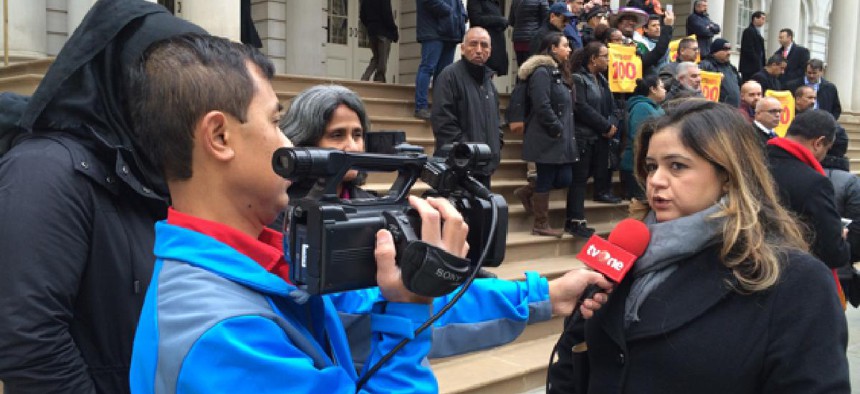Front-line Hero: Giving voice to Afghan women

When a woman leaves Afghanistan for New York City, she is likely to find kindred souls in Fresh Meadows, Queens. But what she often carries to the United States is cultural baggage – baked into family structures and traditions – as well as dreams.
Naheed Samadi Bahram, New York program director for the nonprofit Women for Afghan Women and a member of the inaugural class of the Immigrant Women Leaders Fellowship, has made it her work to help these women realize their dreams.
“When I started taking (local Afghan) women to appointments I found that about 80 percent of them could not speak English, did not know their address or telephone number, and they had been here for 10 years,” she recalled. “Coming to the center was the first time that many of them ever sat in a classroom or held a pen, much less taken notes, something that the rest of us take for granted.”
A $6.6 million human rights organization, Women for Afghan Women offers shelter and medical services in Afghanistan at 31 facilities located in 13 provinces as well as general support services in its thriving New York City community center. It also has an office in Washington, D.C., that focuses on advocacy. Since its inception in 2001, the organization has helped more than 25,000 clients and trained more than 300,000 people on women’s rights worldwide. English as a second language, driving permit test preparation and citizenship test preparation are among the courses offered for free.
These days, Women for Afghan Women is bursting at the seams due to an influx of green card holders motivated to become citizens following the presidential election. Women for Afghan Women plans to move to a larger space later this year.
“While our clients are mainly Afghan, we never turn anyone away,” Samadi Bahram said. Women for Afghan Women receives local support from New York City Council members based in Queens, including Peter Koo and Barry Grodenchik. City Councilman Brad Lander discovered the organization when his daughter became involved in its Girls Leadership program. His wife, Meg Barnette of Planned Parenthood of New York City, now sits on Women for Afghan Women’s board.
Samadi Bahram began her career teaching English to fellow Afghan students in Peshawar, Pakistan, where her family settled after a bomb explosion in Kabul killed her mother. In 2007, shortly after moving to New York to marry her fiance, an Afghan-American, Samadi Bahram began volunteering at Women for Afghan Women at the suggestion of a professor at Queens College, where she completed her degree in 2011. It didn’t take long for her to become an indispensable part of the team because of her education – Samadi Bahram’s father encouraged his daughters to pursue their studies – her own immigration experience and her fluency in English and multiple Afghan dialects.
In 2015, Samadi Bahram was selected from among a pool of 300 candidates to participate in the 15-member inaugural cohort of the New York City Mayor’s Office of Immigrant Affairs’ Immigrant Women Leaders Fellowship. According to the office, the program’s weekly sessions focused on leadership, organizational development and immigrant rights movement-building strategies. Classes were designed to help the fellows “recognize and effectively eliminate the effects of systemic oppression on the leaders, themselves, their organizations and communities.”
At Women for Afghan Women, Samadi Bahram has been dealing with the delicate issue of domestic violence among her clients. “It is normal in Afghanistan to beat a woman, even your sister,” she said. “And women believe, like in Afghanistan, ‘If I leave my husband here, my kids go directly to the husband.’”
Without exposure to the American legal system, such traditions may persist. “These women want to be able to resolve the issue without involving the authorities,” she added, noting that her clients often have trust issues about dealing with authorities after fleeing the Taliban in their home country.
To deal with this sensitive topic, Samadi Bahram developed a workshop to offer clients advice on how to get out of an abusive situation without contacting social services. She demonstrated online resources that can offer support without leaving the house. Following the first workshop of five women, she recounted, “Two walked into my office and said they were victims – one for 18 years and the other for 21 years, and they had kids who were 16 and 17.”
Samadi Bahram enlisted three local imams to help with family mediation in a program that mirrors the Afghan system of “jirga,” where elders in Afghanistan are enlisted to resolve disputes. When necessary, she refers victims of domestic abuse to shelters or attorneys and keeps in contact. She has also helped implement a sensitivity training course for imams through a partner organization called Connect. “The training helps the imams approach the subject in a safe way so as to not ostracize men,” said Samadi Bahram. “We’re so lucky that they’re open to this type of thinking.”
In addition, Samadi Bahram has developed a well-attended Homework Help program for the community’s schoolchildren. Since many of the mothers cannot read English, she recruits volunteers from New York Cares and other nonprofits to assist staff and help with basic math, science and English assignments.
On Jan. 21, Samadi Bahram organized a bus for 40 Women for Afghan Women clients who wanted to attend the Women’s March in Washington, D.C. None had ever attended a rally and, for most, it was their first time out of Queens. She described a joyous bus ride filled with music, dancing and joking as the women celebrated the opportunity for their voices to be heard. Even for Samadi Bahram, who had attended past rallies, the event was liberating.
“Living in a country where we are able to stand up for all our sisters, to be part of such a huge turnout was an amazing experience for all of us,” she said.
